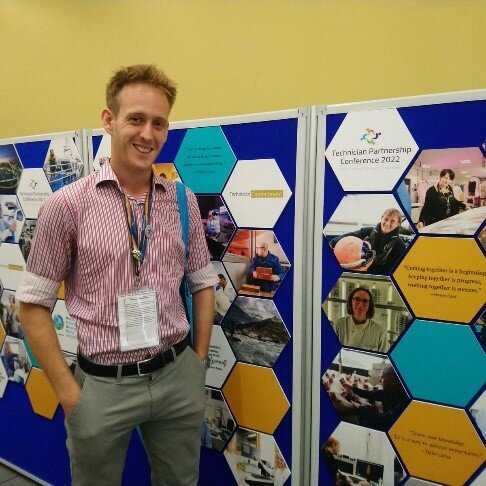
Taking place on the 6th July, the Technician Partnership Conference (TPC) 2022 took place at Newcastle University, bringing together researchers and academics right across the N8 Research Partnership to discuss this year’s main themes; Net Zero, Research Culture and Careers.
We invited Andrew Malcolm-Neale, Research Technician at the School of Physics, Engineering and Technology at the University of York to share his experience from the TPC 2022.
”My first proper trip in life-after-PhD as a research technician involved a 6:45am departure to Newcastle for TPC 2022. I recently started at York Physics as a doctoral level technician as part of a move by our department to better integrate the research support function with experiments. Part department fixer, part experimental physicist, I come from a plasma physics (fusion turbulence) background. Throughout my academic life I’ve been into science communication opportunities, as well as Equality, Diversity and Inclusion (ED&I) networks so I was excited for my first event outing.
An opportunity to see research life from the technical point of view; oriented along the key agendas of sustainability, research culture and technical careers. Things kicked off well with a fantastic collage of the variety of local technicians and technical work and a welcome appreciating technicians as the drivers of change and growth – from fine arts to fundamental physics.
The strands were explored in parallel sessions so my day was spent in one talk from each flavour.
We had Steve Cross on careers setting us up for the day. An engaging guy who actually got us to talk to one other, his nefarious plan to steal dark arts from those who cynically get ahead and harness them for good was right up my street! Lots of good advice about hard skills like documenting successes. But, equal parts an advocate for the ways softer approaches pay dividends; doing favours, creating networks and finding mentors.
This was useful advice because the comparatively opaque paths for progression for tech staff was a recurring theme for the conference. Also, in a room filled with technicians doing groundwork from right across universities in Newcastle, York, Leeds, Sheffield and Durham, we weren’t aware of organisations like the N8 Research Partnership that could be tapped into. We talked about the power of networks to short-circuit hierarchies, and some forums that already existed, to ask any questions and see who from other groups had answers. One prime example is we met a laser technician from York Archaeology on the day who will help us out in our own work, so definitely added value there!
Steve’s last piece of advice: tell your colleagues (especially as managers) what they’re good at! Having demoed science at an indecent number of science fairs, talks, pride parades, his programme @scienceshowoff screamed my language and reminded me of some of the best, most creative outreach programmes I have seen.
Next, I went to hear Daniela Farina from Exeter on sustainability. Isn’t it fantastic how that conversation is almost always now about Net-Zero? She took us through a great case study of their experience implementing the LEAF principles. I honestly can’t add value to what she said beyond pointing to some amazing resources they put together. Some very good commentary about how even without totally eliminating emissions there are substantial cost and resource savings to be had from trying. Daniela made a persuasive case that adopting these principles is mutually beneficial across the academia ecosystem – utility bills go down, technical staff are put front and centre and lab head’s have a stronger impact case for grant applications! That’s the kind of argument we have to make to be able to shift people to our agenda.
I ended with Andrew Filby sharing his experience leading on the Innovation, Methodology and Application research theme at Newcastle. He made much of the need for a team sport to get good science. Despite our obvious specialist skills, he highlighted the lack of progression and parity of esteem (e.g. getting paid less because the university doesn’t regard the PhD as experience for experimental physics) experienced by technicians.
But, changes are happening! The ability to lead on grants and being acknowledged as authors of discoveries were highlighted. Andrew spot lit two inspired models for us. The first is their adoption of research theme organisational structure which levels the esteem playing field by focussing on technical competences. The second was the brilliantly framed ‘brave’ research spaces. If universities want any hope of keeping pace with the horizon of technology they’re going to need technical staff. And, they have a very cool programme; NUTechScan. They’re aiming to search that horizon and move early to adoption and therefore pioneer new technologies.
So, what do we take from this mix?
Interesting as the advertised themes were, I was pleasantly surprised by the amount of actionable content. Lots of schemes that could be adopted if we were to engage with them. Two deep dive keynotes made us think about our skills well beyond the labs we’re used to. I’m looking forward to having the networks active again and building up connections for an even more productive TPC in 2024. We also learned that close-up magic will really mess with people who do science for a living. Perhaps most important of all, TPC 2022 got me excited enough about technicians to revive Twitter and communicate my work again!”
Andrew Malcolm-Neale – @amateurscotsman – Research Technician at the University of York